Please use this identifier to cite or link to this item:
http://hdl.handle.net/10311/1295| Title: | Adherence to anti-diabetic drugs among patients with Type 2 diabetes mellitus at Muhimbili National Hospital, Dar es Salaam, Tanzania- A cross-sectional study |
| Authors: | Rwegerera, Godfrey |
| Keywords: | Type 2 diabetes mellitus anti-diabetic drugs drug adherence Tanzania |
| Issue Date: | 7-Apr-2014 |
| Publisher: | Pan African Medical Journal in partnership with AFNET,www.panafrican-med-journal.com |
| Citation: | Rwegerera,Godfrey M. (2014) Adherence to anti-diabetic drugs among patients with Type 2 diabetes mellitus at Muhimbili National Hospital, Dar es Salaam, Tanzania- A cross-sectional study, Pan African Medical Journal, Vol. 17, 9 pages. |
| Abstract: | Introduction: Adherence to diabetes mellitus treatment regimens among Type 2 diabetes patients in Tanzania has not been well documented. This study sought to assess adherence to antidiabetic drugs and associated factors among patients with Type 2 diabetes mellitus. Methods: A cross-sectional study was conducted among type 2 diabetes mellitus patients who were attending the Diabetic clinic of Muhimbili National hospital between May 2009 and February 2010. Assement ofadherence to antidiabetic medications was based on patients’ self-reported recall of skipped days without taking medications, over the past one week and three months. Data wereentered and analyzed using Statistical Package for Social Sciences (SPSS Inc. Chicago, Illinois version 16). The crude and adjusted odds ratio (COR/ AOR) and 95% Confidence Interval (CI) were performed to determine factors associated with anti-diabetic medications adherence and a p-value of 0.05 or less was considered statistically significant. Results: Adherence rates to antidiabetic drugs were found to be 60.2% and 71.2% at one week and three months respectively. High cost of medication was significantly associated with anti-diabetic non-adherence. Adherence to anti-diabetic drugs significantly increased with an increase in number of non-diabetic medications.Conclusion: Adherence to antidiabetic drugs was found to be suboptimal. Patients with other medical conditions in addition to diabetes mellitus are more likely to adhere to anti-diabetic medications. There is a need for the responsible authorities to set policies that subsidize cost of anti-diabetic drugs to improve adherence and reduce associated complications. |
| URI: | http://hdl.handle.net/10311/1295 |
| ISSN: | 1937-8688 |
| Appears in Collections: | Research articles (Dept of Internal Medicine) |
Files in This Item:
| File | Description | Size | Format | |
|---|---|---|---|---|
| PAMJ-17-252.pdf | Main article | 459.3 kB | Adobe PDF |  View/Open |
Items in DSpace are protected by copyright, with all rights reserved, unless otherwise indicated.
